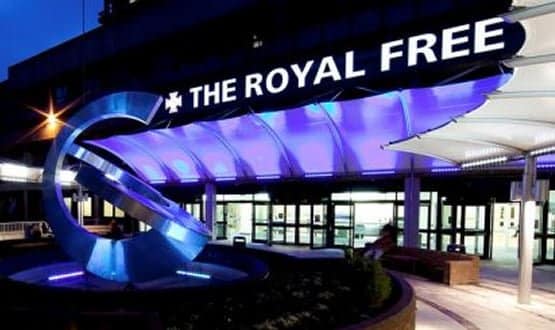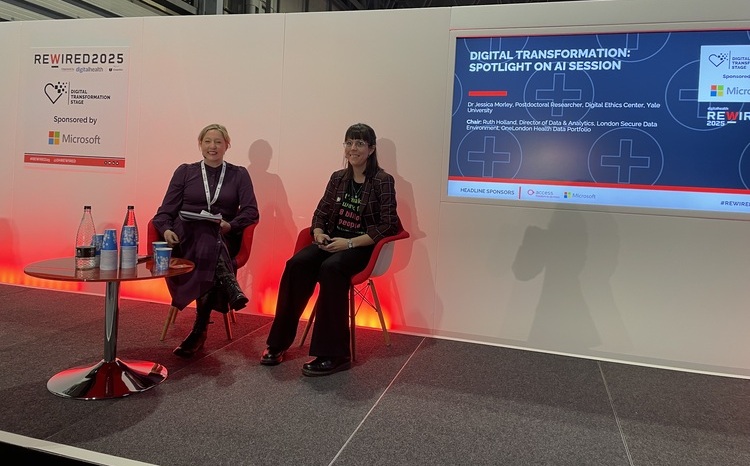Google DeepMind and Royal Free in five-year deal
- 22 November 2016

Google DeepMind has extended its controversial partnership with the Royal Free London NHS Foundation Trust, signing a new five-year deal.
The London trust will work with the British machine learning company, which was acquired by Google in 2014, on further developing the Streams clinical app, which has so far used algorithms to detect acute kidney injury.
In a statement, Royal Free said that app will be used as a diagnostic support tool for a far wider range of illness, alerting doctors earlier of patients at risk of getting ill.
“Like breaking news alerts on a mobile phone, the technology will notify nurses and doctors immediately when test results show a patient is at risk of becoming seriously ill, and provide all the information they need to take action.
“Streams will be extended beyond AKI to help care for patients with other serious conditions including sepsis and organ failure.” The expanded Streams will alert doctors to patient in need “within seconds”, rather than hours, it added.
It should also free up doctors from paperwork, creating more than half a million hours of extra direct care, the trust claimed.
Royal Free medical director Stephen Powis said: "This is about bringing information to doctors and nurses, much in the way we get news alerts on our phones. We know that a quarter of deaths from AKI are preventable if clinicians are able to intervene earlier and more effectively.”
Royal College of Physicians president Professor Jane Dacre said the deal "offers exciting possibilities for improved care for patients and more efficient systems for physicians".
"Whenever we develop new ways of using patient data, it is essential that safeguards are in place for appropriateness and confidentiality, but with these we should embrace the opportunity to improve healthcare quality and reduce the burdens of bureaucracy on clinicians so they can focus on their patients."
DeepMind and Royal Free have been working on the AKI calculator for about a year, but the relationship has been controversial.
Earlier this year, the New Scientist ran a series of stories which stated that the project involved information on 1.6 million patients who had passed through Barnet, Chase Farm and the Royal Free hospitals over five years.
Privacy group medConfidential said that the information had been obtained without patient consent, and that it was excessive because the records did not just cover kidney function.
The concerns lead to an Information Commissioner's Office inquiry into the sharing of patient information between the Royal Free and DeepMind which a spokesperson confirmed on Tuesday was still ongoing.
The independent body had also been in contact with the national data guardian to ensure the compliance of Streams with the Data Protection Act, she said.
However, Royal Free has defended, stating that the collaboration does not require patient consent, since the information is being used for direct patient care, for which there is ‘implied’ consent.
“Throughout the NHS, patient data is routinely collecting and processed by IT companies for the purpose of direct patient care under the principle of implied consent,” the trust said in May this year.
In the latest statement, Royal Free said the data involved would be subject to an “unprecedented level” of audit, including nine independent reviewers. That patient data would be “similar” to that used in the initial AKI trial and would be stored in UK-based data centres.
Royal Free would also have administration access to DeepMind’s use of the data, to track how, and by whom, it was used.
DeepMind co-founder Mustafa Suleyman said: “Privacy and trust are paramount, and we’re holding ourselves to an unprecedented level of oversight.”
However Phil Booth, coordinator of medConfidential said the latest deal was concerning, as it appeared to be based on same information sharing agreement as the AKI trial.
“Our concern is that Google gets data on every patient who has attended the hospital in the last five years and they’re getting a monthly report of data on every patient who was in the hospital, but may now have left, never to return."
Streams has now been registered with the Medicines and Healthcare Products Regulatory Agency, and will be deployed at Royal Free in early 2017, initially aimed at AKI detection.





